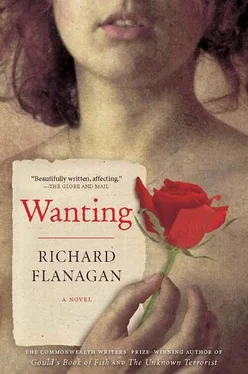Muttering something about the necessity of equalising pneumatic forces within and without—to reassure himself as much as to impress upon his audience that his actions were, as ever, guided by a correct mix of rational science and Christian compassion—the Protector roughly seized King Romeo’s other arm. The black man cried out in pain as, this time, he more stabbed than cut his arm.
He let King Romeo bleed till his patient’s skin was clammy and the Protector once more felt calm. Then he staunched the flow and handed the brimming pannikin of blood to one of the crescent of black women, indicating she was to dispose of it outside.
The Protector straightened up, bowed his head and began to sing.
‘ Lead, kindly Light, amid th’ encircling gloom; lead Thou me on! ’
His voice was quavering and shrill. He swallowed, then with a deeper, louder and more determined baritone continued.
‘ The night is dark, and I am far from home; lead Thou me on! ’
The black women seemed to be joining in—badly, it was true—but then he realised that they had merely altered their dirge-like keening to meld with his hymn.
‘ Remember not past years! ’ he sang, now at the top of his voice, but sometimes even he could not erase the past years. He halted mid-verse but they did not. He rolled his sleeves back down, turned around and was surprised to see Mathinna looking intently at him, as though at once believing he had magical powers and seeking to divine what they were, and yet beginning to doubt the sorcerer’s potency. Unsettled, he searched for a new rhythm of words to soothe his nerves.
‘Now is the period in which King Romeo’s pulmonary system will find its equilibrium,’ the Protector began. ‘Whereby well-being…such that blood…’
Mathinna looked down at her naked feet, and so too for a moment did the Protector; then, feeling an embarrassment verging on inexplicable shame, he looked back up and away, and walked out of the hut into the relief of the cold sea air.
He felt angry, but his anger perplexed him. This was the surgeon’s work, but the surgeon had himself died miserably a month before, and his replacement was promised but could yet be months away. And as angry as he was with the old surgeon for succumbing to dysentery, furious as he was with the Governor for not replacing him more speedily, he was proud of his own ability as a man of medicine, a man who knew how to bleed and blister, who could prepare enemas and dissect corpses and write competent reports—he, a layman, a carpenter, self-reliant and self-made and self-taught, the very triumph of self.
In the afternoon the Protector spent his time to achieve what he felt was good profit, preparing plans for a new, larger cemetery to cope with the mortality that was afflicting the settlement. Near dusk he went to the old burial ground with the natives and asked them to tell him the names of the buried. They seemed very apprehensive to name any of the dead, and, disgruntled at such ingratitude, he dismissed them.
The Protector was determined his new burial ground be complete for the imminent visit of the Van Diemonian Governor, Sir John Franklin, and his wife, Lady Jane, expected a week hence. The wind was gusting up from the south: with such favourable weather it could well be earlier. Sir John was a man of science, one of the age’s greatest explorers and a man of many projects, whether they be exploring the vast Transylvanian wilds of the island’s west or founding scientific societies or collecting shells and flowers for Kew Gardens.
Yes, thought the Protector as he paced out the exact dimensions of the graveyard, a new cemetery and a raising of the standards of the natives’ hymn-singing were real and reasonable goals that he could achieve before the vice-regal visit. Above all else, the Protector prided himself on his realism.
That evening the Protector gave his lecture on pneumatics to an audience that combined the officers and their families and the natives. His final text ran to one hundred and forty-four pages. He felt he had well advanced his argument with logic and occasional practical example, such as when he heated a bottle over a steaming kettle he had hanging over the fire. By holding the bottle over a peeled boiled egg, the egg was slowly sucked up into the bottle.
Troilus laughed at this point and said loudly, ‘Wybalenna bottle, blackfella egg,’ drawing entirely the wrong principle from the demonstration.
After, the Protector shared a glass of hock and some ham sandwiches with the officers, and to show he would tolerate no distinction between black and white, also partook of a pannikin of tea that was served to the natives, which he felt they relished.
King Romeo was found dead the following morning. In truth, his passing was neither unexpected nor unfamiliar, and when the Protector went to examine the body, he felt boredom possessing him in the way pity once had. A woman with whom King Romeo had taken up after the death of his wife a few years earlier was in the normal state of native overexcitement, wailing like a belfry being rung by a madman, her face so many trails of blood from where she had purposely cut herself with a piece of broken bottle.
King Romeo’s daughter, however, seemed possessed of a more Christian sensibility and in her demure grief afforded the Protector some hope that his work was something more than the most colossal vanity. The child was so quiet he wondered if perhaps she might be more amenable to a civilising influence than he had previously thought.
In consequence of attending to King Romeo’s corpse, he was late for the school of which he was master, a failure of punctuality that made the Protector angry with the dead man: example, after all, was everything. If his own example was in any way lacking, how could he expect the natives to change their ways?
His lateness was misread by those in attendance as a loosening of discipline; they continued talking and laughing even while he spoke to them. He found himself furious with them, and rather than beginning the day with the catechism, he berated his class. Had he ever deceived them? Had he not provided good, warm and substantial new brick dwellings? Good raiment? Food in abundance? Moreover, had he not determined to reorganise their dead and put marks above each grave so they might know who was buried where?
After a light lunch of several muttonbirds and bread, he went to the hut that was kept for surgery and post mortems. On a long pine table within lay the body of King Romeo. Later he entered the results of his work as follows:
Died of a general decay of nature: lung adhered to the chest so firmly that it required force to separate it; chest contained large amount of fluid: morbid lung and the spleen and the urethra and appendages were taken out and are to be conveyed to Hobarton for the inspection of dr arthur: he were an interesting man .
At the autopsy’s end, the Protector took out of a wooden case a meat saw he kept specially sharpened and reserved for one purpose only. He favoured it because its ebony handle was heavily crosshatched, allowing him to maintain a firm grip even once his hand was wet, thereby ensuring the neatest job.
He was about to begin when there was a knock on the door, and he opened it to see the native woman Aphrodite begging him to come to her house: her husband, Troilus, was having fits. The Protector spoke to her in his gentlest voice. A voice of pity, he felt. He told her to return to her husband, that he would come soon to minister to him. He closed the door. He returned to the corpse. He placed the saw’s edge precisely in the nape of the neck.
Had he become God? He no longer knew. They kept dying. He was surrounded by corpses, skulls, autopsy reports, plans for the chapel and cemetery. His dreams were full of their dances and songs, the beauty of their villages, the sound of their rivers, the memory of their tendernesses, yet still they kept dying and nothing he did altered it. They kept dying and dying, and he—who had lived in their old world, who continued to work to make this new world perfect in its civilisation, its Christianity, its Englishness—he was their Protector, but still they kept dying. If he was God, what god was he?
Читать дальше












